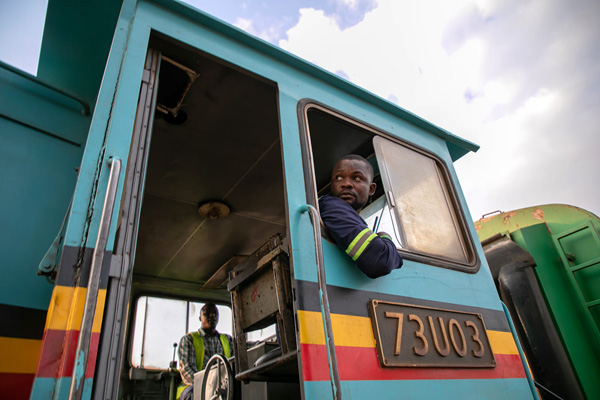Train commuter services to resume next month

A man travels in a train in Kampala recently.PHOTO | FILE
Effective November 1, Uganda Railways Corporation (URC) will resume its train commuter services following months of suspension due to Covid-19 outbreak.
The commuter services were among those halted in March when President Museveni banned public transport for heightened risk of spreading Covid-19.
Mr Stanley Sendegeya, the new URC managing director, confirmed the train would resume transporting passengers to different locations.
“On November 1, we are reopening the passenger service. The service was totally affected, we had started moving around 600,000 passengers which was around 50,000 per month....we have put the SOPs in place,” he revealed.
URC has since easing of lockdown thrown around dates of resumption without fruition. Mr Charles Kateeba former managing director had explained that the risk of spread of the virus was still high.
The commuter train has five coaches with a carrying capacity of a maximum of 200 passengers.
Mr Sendegeya explained that while the corporation wasn’t earning from the passenger service during the lockdown, URC resorted to focusing on movement of cargo.
He explained that various operations including future plans of acquiring locomotives and rehabilitating lines are ongoing to ensure sustained movement of cargo.
“Our long term plan is to increase cargo transportation from targeted 45,000 metric tonnes per month to 90,000 metric tonnes per month by end of 2021,” he said, noting that currently, URC moves about 20,000 metric tonnes per month.
URC is also refurbishing the Tororo-Gulu line and Kampala-Kasese with funding from the European Union and government.
However, the cost of doing business via the train network, according to President Museveni is still high and ought to be reduced.
“That is the assignment the President has given us. He wants to see that we bring the cost of net tonne per kilometer to minimum five cents. The international standards is three cents … currently we are doing between nine and 13 cents per,” he said.
Mr Sendegeya also said that refurbishment of lines will ensure faster movement and reduced fuel costs, which will have an impact on the costs charged to customers.
Formerly URC’s chief finance officer for close to five years, Mr Sendegeya is the new managing director, having replaced Mr Kateeba who had been at URC for more than 36 years under different capacities.
Building relationships
According to Mr Sendegeya, URC will, under his leadership, strengthen its relationship with key stakeholders such as clients and contractors among them National Enterprise Corporation, which is charged of ensuring that the lines are clean to reduce accidents.
He also said there is a plan to permit clients with the ability to buy trains which would solely be dedicated to their companies.
“We are also going to talk to key clients if they can invest in dedicated assets, if you can buy a locomotive, we dedicate it to your business, it is yours and we give you a line,” he said without divulging intricacies on how it would operate.


